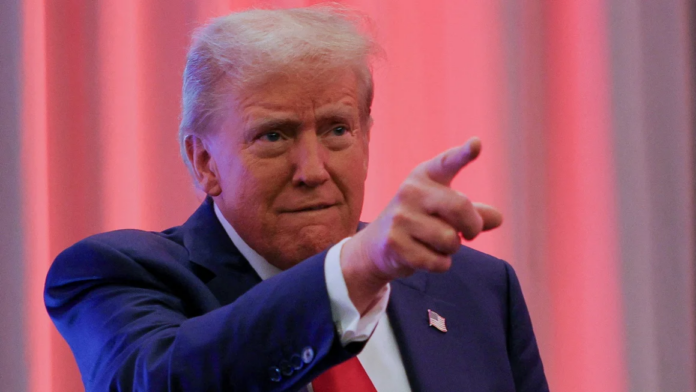US President Donald Trump says he will hit movies made in foreign countries with 100% tariffs, as he ramps up trade disputes with nations around the world.
Trump said he was authorising the US Department of Commerce and Trade Representative to start the process to impose the levy because America’s movie industry was dying “a very fast death”.
He blamed a “concerted effort” by other countries that offer incentives to attract filmmakers and studios, which he described as a “National Security threat”.
“It is, in addition to everything else, messaging and propaganda!” Trump said on his Truth Social platform. “WE WANT MOVIES MADE IN AMERICA, AGAIN!”
US Commerce Secretary Howard Lutnick responded to the latest announcement, saying “We’re on it”.
But the details of the move are unclear. Trump’s statement did not say whether the tariff would apply to American production companies producing films abroad.
Several recent major movies produced by US studios were shot outside America, including Deadpool & Wolverine, Wicked and Gladiator II.
It was also unclear if the tariffs would apply to films on streaming services, like Netflix, as well as those shown at cinemas, or how they would be calculated.
The UK’s Department for Culture, Media & Sport, industry body the British Film Institute and the Motion Picture Association, which represents the five major US film studios, did not immediately respond to BBC requests for comment.
The governments of Australia and New Zealand have spoken out in support of their countries’ film industries.
“Nobody should be under any doubt that we will be standing up unequivocally for the rights of the Australian screen industry,” Australia’s home affairs minister Tony Burke said.
New Zealand’s Prime Minister Christopher Luxon told a news conference that his government was awaiting further details of the proposed tariffs.
“But we’ll be obviously a great advocate, great champion of that sector and that industry,” he added.
Since returning to the White House in January, Trump has imposed tariffs on countries around the world.
He argues tariffs will boost US manufacturers and protect jobs – but the global economy has been thrown into chaos as a result, and prices on goods around the world are expected to rise.
Ahead of his inauguration, Trump appointed three film stars – Jon Voight, Mel Gibson and Sylvester Stallone – to be special ambassadors tasked with promoting business opportunities in Hollywood, which he described as a “great but very troubled place”.
“They will serve as Special Envoys to me for the purpose of bringing Hollywood, which has lost much business over the last four years to Foreign Countries, BACK—BIGGER, BETTER, AND STRONGER THAN EVER BEFORE!” Trump wrote at the time.
The US remains a major film production hub globally despite challenges, according to movie industry research firm ProdPro.
Its most recent annual report shows the country saw $14.54bn (£10.94bn) of production spending last year. That was down by 26% since 2022, though.
Countries that have attracted an increase in spending over the same period include Australia, New Zealand, Canada and the UK, according to the report.
Even before this most recent announcement, the US movie industry had been impacted by the fallout from Trump’s trade policies.
In April, China said it was reducing its quota of American films allowed into the country.
“The wrong action of the US government to abuse tariffs on China will inevitably further reduce the domestic audience’s favourability towards American films,” the China Film Administration said.
“We will follow the market rules, respect the audience’s choice, and moderately reduce the number of American films imported.”
Trump has hit China hardest with his tariffs salvo, imposing import taxes of up to 145% on goods from there.
His administration said last month that when the new tariffs are added on to existing ones, the levies on some Chinese goods could reach 245%.
Beijing has hit back with a 125% import duty on goods from the US.
Other countries currently face a blanket US tariff of 10% until a pause on higher levies expires in July.
Speaking to reporters aboard Air Force One on Sunday, Trump said he was meeting with many countries, including China, on trade deals.
He added, however, that he had no plans to speak with his Chinese counterpart Xi Jinping this week – despite previous reports that Washington had approached Beijing about holding trade talks.
Asked if any trade agreements would be announced this week, Trump said that could “very well be”, but gave no details.
Earlier, Trump signalled he may be willing to lower tariffs on China.
“At some point, I’m going to lower them, because otherwise, you could never do business with them, and they want to do business very much,” he said in an interview that aired Sunday on NBC’s Meet the Press.
In the same interview, Trump said he may grant another extension to a deadline for China-based ByteDance to sell the US operations of TikTok.
He has already given two reprieves from a law that threatens to ban the short video app if it is not sold to a non-Chinese company.
ByteDance currently has until 19 June to reach an agreement over ownership of the platform, which is used by 170 million Americans.
Negotiations over a potential deal have stalled since Trump imposed steep new tariffs on China.
ALSO READ:



